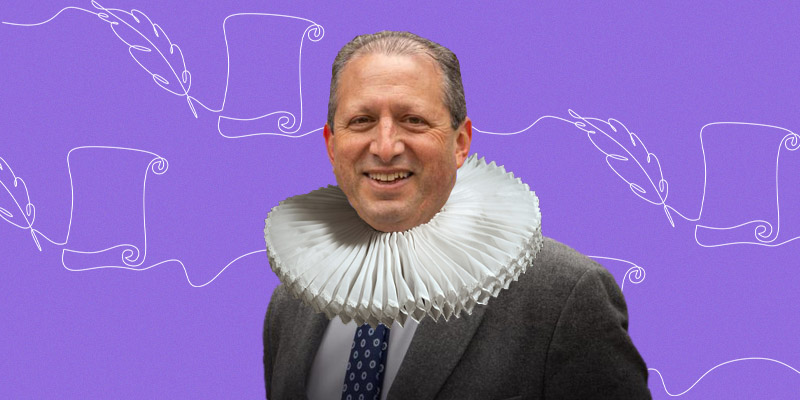July 17, 2025, 2:32pm
Brad Lander’s having a great summer. From bravely standing up to ICE thugs, to becoming best buddies with mayoral candidate Zohran Mamdani, to releasing one of my favorite campaign videos of all time, the NYC comptroller is doing great right now.
He was also invited to the grand opening of the The Public Theater’s newly refurbished Delacorte Theater. The ribbon-cutting was attended by other celebrities and supporters, and just before this season’s Shakespeare in the Park program is set to open on August 7th with performances of Twelfth Night.
Choosing to forgo the standard speech, Lander instead composed an original sonnet for the Delacorte’s opening, captured here:
I’ve transcribed the sonnet below, too, if you’d prefer to read it.
I’ll admit that when someone announces they’ve composed an original poem for an occasion, my stomach tends to flip in fear. We’ve all been burned by a family member who penned a cheeky limerick for Thanksgiving or a best man who is recalling the groom’s college years in verse. But for a public official turned poet, I think Lander did pretty well.
Is this the traditional 14 line, iambic pentameter form we studied in school? Not by my scansion. It looks like Lander went a little free-verse on us, which is fine, but does not a sonnet make. I have to break out the red pen and dock a few points.
I like starting with the direct parody of Shakespeare, it’s a smart way to set the stage and get everyone onboard with some quick laughs. I like the twist of “quite predictable fortune,” and “raccoons” is a fun specific—appreciate the choice to not reach for the low-hanging fruit of pigeons or rats, NYC’s perennial punching bags.
The parody gets dropped pretty quickly, which I get since Hamlet’s sonnet goes dark at the point Lander veers from the Shakespeare. I get why he wouldn’t want to riff on death and sleep at a theater celebration, but more direct parody would have served the poem, I think. The lines reimagining Shakespeare are fun, and if you’re reading for a crowd of dedicated Bard-heads, why not give ‘em what they want?
The turn in the middle from jokey to serious is decently well handled, though I maybe would have committed harder to one lane or the other. Lander’s jokes are a bit better than his more serious bars, at least to my ear.
Though I will say, there are some nice turns of phrase here. I like describing the city as “these isles” and the couplet, “But also that sometimes good does prevail/In a city perchance that we could all afford” definitely got a quiet “hell yeah” from me (I would be more exuberant, but I work from home and am trying to be a good neighbor).
The performance? Pretty good too. A little more emphasis here and there would help to sell the punchlines and the slant rhymes a little better, but I’m also very won over by his Park Slope dad charm.
Overall, I give this is a solid B+. Well done! I can’t wait to read more of your sonnets—do one about being comptroller next!
Brad Lander’s Sonnet 1*
To renovate or not to renovate, that was the question,
Whether ’twas nobler in this space to suffer
The slings and arrows of quite predictable fortune,
Or to take arms against the sea of raccoons
And by construction thwart them.
Against the envy of less happier lands,
This blessed park, this earth, this realm, these isles ,
Will now delight new generations,
And have dressing room rooms that don’t drown actors’ style.
And what a time to reopen this stage,
With enemies of culture on the prowl,
Pitting fear and faux populist rage
Against empathy and attack most foul.
Our tyrant locks up immigrants, comptrollers too,
And sows chaos no matter the cost,
so, what’s a public theater to do,
To ensure that our democracy is not lost?
Happily one answer is right here,
In new seats and stage for all New York to see,
Our hearts and our democracy restored through Shakespeare,
That uplifts us all for free.
Here we’ll see that leaders too often fail,
And betray the noble goals that once they swore,
But also that sometimes good does prevail,
In a city perchance that we could all afford.
History’s lessons are our priceless treasure from The Bard,
Ne’er more important than when listening to them is hard.
With that hopeful message, I must end this rhyme,
So hallowed and so gracious is the time.
*As far as I can tell this is his first sonnet, but happy to correct if he’s got a chapbook or two I missed.
